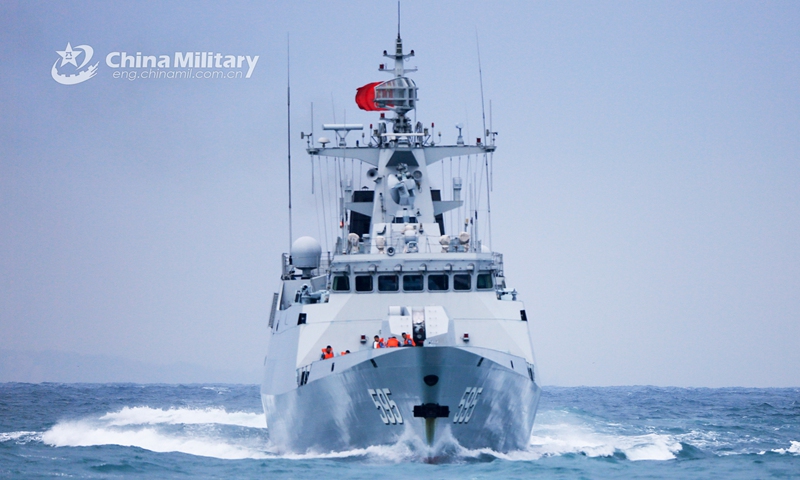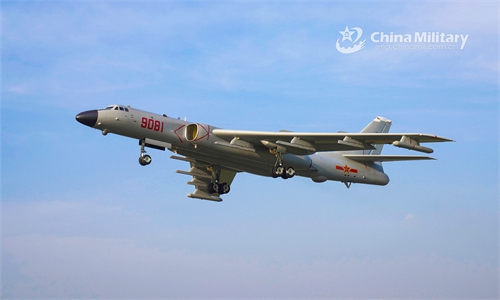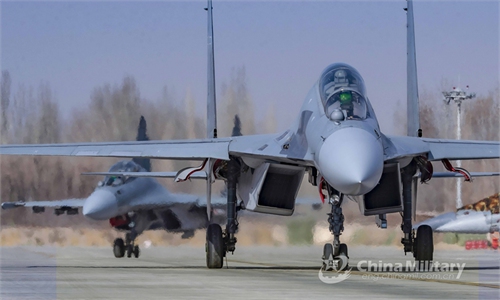US Navy guidance document aims at strengthening alliance using Taiwan question, but it can hardly prevail

The guided-missile frigate Chaozhou (Hull 595) attached to a frigate flotilla with the navy under the PLA Eastern Theater Command steams in waters of the East China Sea during a maritime realistic training exercise from May 8 to 11, 2020.Photo:China Military
The Navy secretary will release a strategic guidance document this week outlining how the US Navy and US Marine Corps will maintain maritime dominance globally, strengthen strategic partnerships and empower people to succeed against China, according to US media outlet Defense News. To release such a strategic document suggests that the US is now clear the Chinese People’s Liberation Army(PLA) Navy is becoming stronger and will have a more powerful presence in the wider Indian Ocean region.
When asked how to handle China and its continued “threats” toward the island of Taiwan, Secretary of the Navy Carlos Del Toro, who has led the US Navy for two months, said on Tuesday that it was “critically important” for the US Navy to build up partnerships with “countries like Australia, India, the Philippines, Indonesia, many of the other countries in the Indo-Pacific.” The real purpose behind this is that the US wants to use the Taiwan question as an excuse to create a bigger maritime encirclement against the Chinese mainland in the region.
After putting forward the Indo-Pacific Strategy, the US needs a strong military alliance system to support it. Its existing allies are no longer enough, so it hopes to find new military partners around the South China Sea. Then the Philippines and Indonesia became its desired anchor points.
However, the US has made little progress so far because the Philippines and Indonesia are quite repulsed against the US’ military interference in the region.
As it looks for a reason to use multilateral military cooperation system to lay the groundwork for future naval deployments to countries such as the Philippines and Indonesia, the Taiwan question has become the US’ best excuse. But there are obvious weaknesses in such a military chain: Southeast Asian nations do not want the US to expand its military presence nearby.
Del Toro said that the goal is not to fight China or enter into a conflict. But as long as the US continues to inflame the Taiwan question, conflicts will be inevitable. The Taiwan question is the key point of the US’ Indo-Pacific Strategy, through which the US can better balance the military power of the PLA. The PLA, however, is fully capable of controlling the area around the Taiwan Straits, and the US would suffer huge losses and have little effect whether using aircraft carriers or air intervention. This determines that the US would not take the risk or stop the Chinese mainland to achieve national reunification although its covert efforts to provoke the Taiwan military and regional countries to get involved in a war will continue to intensify.
The US Navy hopes that “China… look around and basically say, we don’t have any friends, we don’t have any maritime allies who will work with us; perhaps this isn’t the right choice to make. And hopefully that will deter them from what some believe is their ultimate goal, which is to take Taiwan.” This is a very traditional military strategy of encirclement, blockade and isolation. But as China’s influence is growing and most countries in the world have recognized the one-China principle, the US will lack support in the international environment. In other words, it is wishful thinking to try to isolate China with the Taiwan question. The cost of “being US’ allies or in partnership” is so high, just check out its records of betrayal. Such deterrence of “China doesn’t have any friends” is meaningless, and China will never give up its goal of national reunification. In a real military operation against the Chinese mainland, the US has no allies at all.
Del Toro stressed in his speech of the need “to provide the necessary arms and weapons and technology necessary for Taiwan to be able to defend itself.” The truth is that the US has been selling military weapons to the island of Taiwan, first, to make money by selling obsolete or stockpiled weapons to satisfy arms dealers, and then, to balance the Chinese mainland. But all the arms it sold to the island are within the range of the PLA’s control. The weapons and technology that the US can provide are very limited, and they will not be free, let alone have any advantage in actual combat.
The US has always been a leader in the development of new weapons, but if the US wants to intervene in the Taiwan Straits, it will lose. Once a war breaks out with a powerful country, the US will face a full range of military strikes, including its overseas bases. The US Navy will at best send some bombers or fighter jets to make a pose, but they dare not open fire against the PLA.
The author is a Beijing-based military analyst. opinion@globaltimes.com.cn


